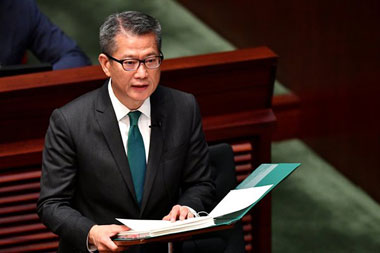
Delivering the 2019-20 budget, Hong Kong Financial Secretary Paul Chan unveiled a raft of initiatives to promote economic development and diversify Hong Kong’s economy.
The Financial Secretary reported that Hong Kong’s economy grew by 3 percent in 2018, at the lower end of the range projected in last year’s budget but still above the trend growth rate of 2.8 percent over the past decade. For 2019, the government forecasts real GDP growth of between 2 to 3 percent.

Hong Kong Financial Secretary, Mr Paul Chan unveils the 2019-20 Budget
|
Headline inflation of about 2.5 percent is forecast for 2019, compared to 2.4 percent in 2018.
The labor market remains tight, with the unemployment rate at 2.8 percent, the lowest level in more than 20 years.
To ensure Hong Kong’s competitiveness, Mr. Chan stressed the need to develop talent-intensive industries and focus on high value-added activities. He cited two areas where Hong Kong can leverage its advantages, namely innovation and technology (I&T) and financial services. “The development of I&T will bring huge economic benefits to Hong Kong,” Mr. Chan said. “The intellectual property so generated can be commercialized to drive ancillary economic activities, thus creating quality employment opportunities and enabling people to live comfortably by adopting new technology.”
Mr. Chan earmarked HK$5.5 billion (US$705 million) for a further phase of development at Cyberport, a hub for start-ups and the flagship for the city’s digital technology industry. He also set aside HK$16 billion (US$2 billion) to enhance research and development (R&D) facilities at universities, as well as resources to foster local technology talent.
The government has provided funding of HK$10 billion (US$1.3 billion) to set up two innovative clusters at the Science Park, pooling top-notch Hong Kong and overseas research institutions to undertake R&D activities together. A number of leading universities in the United States such as Harvard University, Stanford University and Johns Hopkins University have expressed interest in joining the two clusters.
Notable initiatives to promote financial services include issuing the first batch of government green bonds, studying the case of establishing a limited partnership regime and introducing a more competitive tax arrangement to attract private equity funds, promoting mutual recognition of funds with other jurisdictions, providing tax concessions for marine insurance and the underwriting of specialty risks and facilitating the issuance of insurance-linked securities.
On financial technology, Mr. Chan said virtual banking licenses would soon be issued by the Hong Kong Monetary Authority.
To enhance Hong Kong’s role as an international hub for legal services, funds have been earmarked to support the development and initial operation of an on-line arbitration and mediation platform by a non-governmental organization.
Regarding Hong Kong’s property market, Mr. Chan declared that the government had no intention to withdraw demand-side management measures at this stage.
Mr. Chan said he would make optimal use of the fiscal surplus, introducing a variety of one-off measures to alleviate people’s hardship and support local enterprises.
The 2018-19 revised estimate of government revenue is HK$596.4 billion (US$76 billion). As for government expenditure, the revised estimate is HK$537.7 billion (US$69 billion).
The budget surplus for the 2018-19 financial year is forecast to be HK$58.7 billion (US$7.5 billion). Fiscal reserves are expected to reach HK$1,161.6 billion) (US$149 billion) by end of March 2019.
In preparing the budget, Mr. Chan said he had adhered to the new fiscal philosophy of the current-term government of adopting strategic financial management principles to invest for Hong Kong and relieve people’s burden on the premise of ensuring healthy public finances.
Budget 2019-20
|